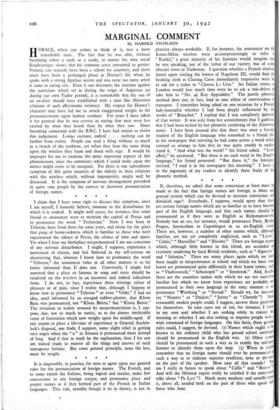It is impossible, in practice, for men to agree upon
any general rules for the pronunciation of foreign names. The French, and to some extent the Italians, being logical and insular, make few concessions to any foreign tongue, and pronounce place and proper names as if they formed part of the French or Italian languages. This rule, sensible though it be in theory, is not in practice always workable. If, for instance, the announcer on the Rome-Milan wireless were uncompromisingly to refer to " Kurkil," a great majority of his listeners would imagine that he was speaking, not of the father of our victory, but of some obscure town in Turkestan. I question whether a French student, intent upon. visiting the homes of Napoleon III, would find .the booking clerk at Charing Cross immediately responsive were 'he to ask for a. ticket to "Cheese Urst." An Italian visitor to, London would lose much time were he to ask a taxi-driver to take him to " No. 42 Kay Appsiddey." The purely phonetic method .does not, in fact, lead to ease either of conversation or transport. I remember being asked on one occasion by a French lady-journalist whether I had been deeply influenced . by the works of " Benachot." I replied that I was completely ignorant of that writer. It was only from her astonishment that I gathered that I had been misled by her phonetic rendering of the illustrious name. I have been assured also that there was once a foreign student of the English .language who remarked to a friend that in the newspaper that morning he had come across a word which seemed so strange to him that he was quite unable to under- stand it. " And what was the word? " his friend asked. " Low- offoly," he answered. " But there is no such word in the English language," his friend protested. " But there is," the fOreigner insisted, " I read it in the newspaper this morning." I leave d to the ingenuity of my readers to identify these fruits of the phonetic method.


























 Previous page
Previous page